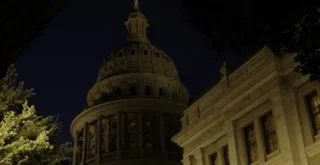- National Library Week in Los Fresnos
- Lady Falcons are Class 6A Champions
- New Beauty Clinic Opens Up in Los Fresnos
- “Houston’s Most Notable” —Los Fresnos Raised
- Earth Day 2024 coming April 6th in Los Fresnos
- Another Successful Golf Tournament for the Leo Aguilar Foundation
- Back to The Moon Again
- March 2024 Your Health Matters
- Lady Falcons in Tournament Play
- Easter Fun at Big Red’s Ranch
Texas Bill Provides Alternatives to Jail for Inability to Pay Fines
- Updated: June 16, 2017

The sponsor of a new sentencing guidelines bill says its purpose is to keep Texas jails from acting as ”debtor’s prisons.” Photo: Wikimedia Commons
by Mark Richardson
AUSTIN, Texas – A measure passed by the Texas Legislature is designed to prevent people convicted of low-level crimes from being sent to jail when they can’t afford a fine or fees.
Senate Bill 1913 was approved by just five votes in the waning hours of the legislative session and awaits the governor’s signature.
Its sponsor, state Sen. Judith Zaffirini of Laredo, says the purpose is to keep Texas jails from acting as “debtor’s prisons.”
Attorney Brett Merfish with the public-interest group Texas Appleseed, says the idea is to stop what’s known as the “cycle of court debt.”
“People would not be taking up space in our local jails, and instead be able to serve out their sentences and also not lose their jobs, not have that interruption in their lives,” she says. “Usually, if people are indigent and can’t pay, being in jail can lead to a cascade of other consequences in their lives.”
The bill requires judges to evaluate a person’s ability to pay fines for lower-level offenses that most often don’t include jail time, such as traffic tickets or low-level misdemeanors, and would keep them out of jail simply because they can’t afford the fines. It also allows judges to lower fines, set payment plans or order community service in those cases.
Merfish says a Texas Appleseed study shows significant numbers of Texans are spending time in jail simply because they are poor.
“These practices are widespread – so, in these cases of fine-only offenses, over 16 percent of them are satisfied by jail credit, which we think is an indicator for when people can’t pay,” she adds.
She says each year, hundreds of thousands of Texans are caught in the cycle of court debt, often losing their jobs, cars, homes and even custody of their children.
“There’s certainly further reform, but we’re happy with this as a first step to having practices and procedures in courts that will highlight this issue for judges, and ensure that people are given alternatives to payment,” explains Merfish.
Last year, ACLU Texas filed suit against the Galveston County town of Santa Fe, alleging its city court assessed assessed excessive fines and warrant fees on people convicted of low-level crimes to help fund the city’s $600,000 budget shortfall. The case is still pending.





